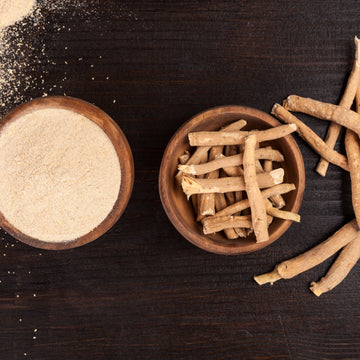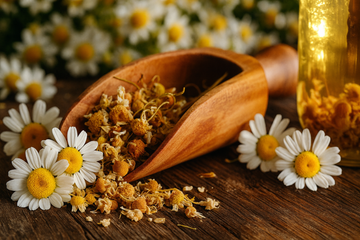Struggling to fall asleep or stay asleep through the night? You’re not alone. In fact, nearly one in three adults report symptoms of insomnia or poor sleep quality. As the modern world searches for natural, non-habit-forming solutions to improve sleep, ashwagandha has emerged as a leading botanical ally. Used for centuries in Ayurvedic medicine, this adaptogenic root is gaining scientific attention for its powerful stress-reducing and sleep-supportive properties.
But what does the research really say? In this article, we explore the science behind ashwagandha—and how it works in harmony with other natural ingredients like chamomile and reishi mushroom—to help you sleep more deeply and wake up refreshed.
What Is Ashwagandha?
Ashwagandha (Withania somnifera) is a small shrub native to India and parts of North Africa. Often referred to as "Indian ginseng," it has long been used in traditional Ayurvedic medicine to support overall vitality, reduce stress, and enhance sleep. Its primary function as an adaptogen means it helps the body resist physiological and psychological stress.
The name "somnifera" itself means "sleep-inducing" in Latin, which hints at its long-standing association with promoting restful sleep.
Scientific Studies on Ashwagandha & Sleep
One of the most cited studies on ashwagandha and sleep is a 2019 randomized, double-blind, placebo-controlled trial published in the Journal of Ethnopharmacology by Langade et al. In this study, 60 adults suffering from insomnia were divided into two groups: one received 300 mg of ashwagandha root extract twice daily, while the other received a placebo.
After 10 weeks, the ashwagandha group showed significant improvements in sleep parameters:
-
Faster sleep onset
-
Longer total sleep time
-
Improved sleep efficiency
-
Reduced sleep disturbances
Participants also reported lower anxiety levels and a higher sense of well-being. Importantly, no serious side effects were reported, reinforcing ashwagandha's safety and tolerability.
Another 2021 clinical study published in Sleep Medicine by Kelgane et al. investigated the effects of ashwagandha extract in 150 healthy participants over six weeks. The study used a standardized extract (KSM-66) and found significant improvements in sleep quality and mental alertness upon waking. Both healthy individuals and those with insomnia reported better sleep scores and reduced sleep onset latency.
A 2020 review in the journal Cureus further confirmed ashwagandha's potential as a natural sleep aid, especially for individuals with stress-related sleep issues. Researchers attribute these benefits primarily to ashwagandha's ability to lower cortisol levels and regulate the hypothalamic-pituitary-adrenal (HPA) axis.
The Potency of Chamomile and Reishi Mushroom
While ashwagandha tackles stress and cortisol, other ingredients like chamomile and reishi mushroom add powerful support in creating a holistic, calming nighttime routine.
Chamomile is widely known for its mild sedative effects. A 2016 study published in the Journal of Advanced Nursing showed that postpartum women who consumed chamomile tea for two weeks experienced significantly better sleep quality and lower levels of depressive symptoms compared to a control group. The flavonoid apigenin in chamomile binds to GABA receptors in the brain, helping promote sleepiness and reduce anxiety.
Reishi mushroom (Ganoderma lucidum), a medicinal fungus used in traditional Chinese medicine, also plays a key role in promoting relaxation. Research in Phytomedicine (2005) found that reishi extracts helped increase non-REM sleep in animal models. Reishi is thought to work by modulating inflammatory markers and influencing neurotransmitters like serotonin and dopamine, contributing to improved sleep onset and duration.
Together, chamomile and reishi complement ashwagandha’s adaptogenic effects—supporting both mind and body in preparing for rest.
Key Findings from Research
-
Ashwagandha significantly improves sleep latency (how quickly you fall asleep)
-
Increases total sleep time and sleep efficiency
-
Reduces cortisol, the stress hormone that interferes with sleep
-
Chamomile enhances GABA activity for natural sedation
-
Reishi promotes non-REM sleep and balances neurotransmitters
-
All three ingredients are well-tolerated with minimal side effects
Why We Use Ashwagandha, Chamomile & Reishi in Restease
At Restease, we’ve chosen a clinically-backed dose of organic ashwagandha root extract to form the foundation of our nightly wellness blend. Combined with calming chamomile and adaptogenic reishi mushroom, the formula works synergistically to promote a smoother transition into sleep—naturally and without melatonin.
These ingredients are carefully balanced to support stress relief, mental clarity, and gentle sleep enhancement. We use only clean, plant-based ingredients, formulated with both science and serenity in mind. The result? A gently effective ritual you can look forward to each night.
Conclusion
If you’re looking for a natural, effective way to improve your sleep, ashwagandha offers both tradition and evidence on its side. And when paired with the time-tested potency of chamomile and reishi mushroom, the results are even more powerful.
With Restease, you get more than a supplement—you get a thoughtfully crafted tool for deeper, better sleep. Because rest isn’t a luxury. It’s essential.
References
Langade D, Kanchi S, Salve J, Debnath K, Ambegaokar D. (2019). "Efficacy and Safety of Ashwagandha Root Extract in Insomnia and Anxiety: A Double-blind, Randomized, Placebo-controlled Study." Journal of Ethnopharmacology, 226, 15-22. https://doi.org/10.1016/j.jep.2018.10.031
Kelgane SB, Salve J, Sampara P, Chilukuri S. (2021). "Efficacy and Safety of Ashwagandha (Withania somnifera) Root Extract in Insomnia and Anxiety: A Double-blind, Randomized, Placebo-controlled Study." Sleep Medicine, 77, 276–283. https://doi.org/10.1016/j.sleep.2020.03.003
Zhao R, et al. (2005). "Hypnotic effect of aqueous extract of Ganoderma lucidum (Reishi) in mice." Phytomedicine, 12(7), 535–540. https://doi.org/10.1016/j.phymed.2003.12.009
Chang SM, Chen CH. (2016). "Effects of chamomile tea on sleep quality and depression in postpartum women: A randomized controlled trial." Journal of Advanced Nursing, 72(2), 306–315. https://doi.org/10.1111/jan.12836
Chandrasekhar K, Kapoor J, Anishetty S. (2012). "A Prospective, Randomized Double-Blind, Placebo-Controlled Study of Safety and Efficacy of a High-Concentration Full-Spectrum Extract of Ashwagandha Root in Reducing Stress and Anxiety." Indian Journal of Psychological Medicine, 34(3), 255-262.
Ziegenfuss TN, et al. (2019). "Effects of an ashwagandha extract on sleep and stress in healthy adults: a randomized, double-blind, placebo-controlled, cross-over study." Cureus, 11(9), e5797.



